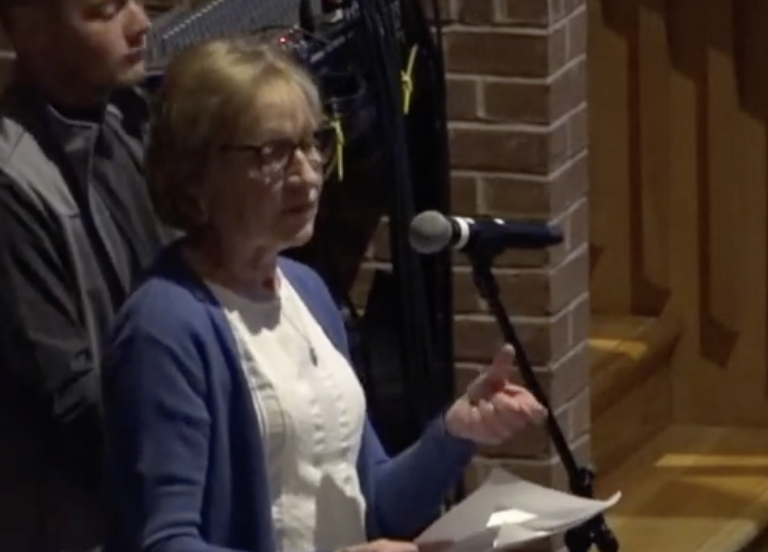GLOCESTER – Glocester taxpayers acquired a preview of the upcoming city funds at a current listening to held at Ponaganset Excessive Faculty. The proposed municipal funds quantities to $9,107,526, a rise of $167,507 or 2 p.c, over this 12 months’s $8,940,019. The Glocester colleges funds request is $12,295,102, a rise of $806,989, or 7.02 p.c over the earlier 12 months of $11,488,113.
There have been many questions, notably from longtime funds board member David Steere, who identified issues, notably with the native colleges’ funds. These included every thing from unexplained additions to the fiscal plan to what gave the impression to be a 23 p.c increase for Supt. Renee Palazzo.
“It might have been good if the funds was submitted not less than to the funds board in a well timed method the place we may check out it and ask some questions,” mentioned Steere. “It may not have modified something, however it will have made it clearer to us in any case, what you had been asking for.”

Steere identified that the varsity district has already spent $1 million greater than their funds for the present 12 months. The adopted funds for 2023-24 was $10,788,528, whereas the precise quantity spent was $11,852,865. The income, nonetheless, was $500,000 plus greater than anticipated. The underside line, Steere mentioned, was a deficit of $357,495.
“That’s the second 12 months in a row for the deficit,” mentioned Steere.
For the present 12 months, he added, the working bills are $11,488,113, which is $364,000 lower than what bills had been for 2024.
“That’s a sign that you just is perhaps in just a little little bit of hassle,” mentioned Steere.
He then identified a line merchandise within the faculty funds for “switch from fund stability” of $300,000.
“The issue is you don’t have $300,000 to switch,” mentioned Steere. “You’ve acquired $168,000. So, as soon as once more, that’s placing you within the gap earlier than you even get began. I don’t know in case you are taking a look at a deficit once more, or whether or not there’s a optimistic, a small optimistic, I don’t know. That’s one thing you of us in all probability ought to share with everyone tonight if you happen to can.”
Steere additionally identified that the Price range Board can’t make adjustments to the varsity funds, and that the doc submitted for the listening to was not the one which had been beforehand submitted to budgeters. The one submitted to the funds board truly had an appropriation enhance in extra of $2 million, whereas the brand new request confirmed a rise of $1,242,217.
“Even when the City Council mentioned we had been going to present every thing to the Faculty Committee, it’s not that form of cash,” he mentioned. “There’s simply not that form of cash we can provide to the Faculty Committee.”
The district’s proposal exhibits an working bills enhance of $806,000, and $305,000 in revenues projected.
By state regulation, cities can’t enhance their levy by greater than 4 p.c.
Steere questioned a number of areas, together with a sudden $430,000 for bus transportation, which he mentioned was by no means budgeted beforehand. If the funds had been submitted to the board in a well timed method, he mentioned, then perhaps the committee may have defined why this immediately appeared out of nowhere.
One other sticking level was $63,000 budgeted for Northwest Particular Providers, which he mentioned was not included in budgets in recent times. Steere mentioned the final time the expense was budgeted was for 2023-24 at a price of $28,215.
“I don’t know, it may have been a very good quantity,” Steere mentioned. “It might have been good to ask.”
Different discrepancies he identified included a line merchandise of “Tuition, private day,” budgeted for $360,000. The final 12 months that expense was budgeted was within the 2023-2024 funds for $18,000.
The superintendent was budgeted for what was listed as a 23 p.c increase as properly.
Steere mentioned that sooner or later, it will be a good suggestion for the committee to submit their funds in time to reply questions the funds board may need, however to additionally clarify the will increase and reply any questions taxpayers may need.
“I feel sooner or later it’d be a good suggestion if at a public listening to equivalent to this that the committee not solely submits their funds in a well timed method however goes by means of their funds so everyone has an excellent understanding of what’s in your funds and the way the cash is being spent.”
When the time got here, Glocester Faculty Committee member Beth Keeling spoke, explaining how the colleges have been spiraling over the course of current years.
“The story of our elementary colleges mess started 15 years in the past, when the state legislature recalculated the varsity funding formulation for Rhode Island colleges,” she mentioned. “Sadly, Glocester was one of many districts which misplaced state assist over a ten 12 months interval.”
After assembly with the committee on the time, she recalled, the council agreed to present cash to the colleges to assist make up for the lack of state assist underneath sure situations, together with that the funding didn’t go towards the city’s upkeep of effort. Below Rhode Island regulation, upkeep of effort signifies that municipalities should contribute an quantity not lower than its native contribution for colleges within the earlier fiscal 12 months.
The committee made efforts to cut back prices by altering and lowering bus routes, shifting college students to completely different colleges, and in search of assist from the native Division of Public Works with paving tasks and different upkeep.
“We did every thing we may to mitigate the lack of state assist,” mentioned Keeling. “The funds did work for awhile. We managed to get by means of annually; nonetheless, now that we’ve hit this level with cash not going to upkeep of effot and now not having a fund stability, we’re on this hassle.”
She recalled Steere getting up and telling the council two years in the past that the colleges wanted cash. That 12 months, they’d requested for a 2.82 p.c enhance and obtained 0.55 p.c, she mentioned. Enrollment has remained the identical and workers numbers have remained the identical.
“If we’re to chop workers members, then kids fall behind, and kids fall behind on the elementary stage,” she added.
Academics agreed to take a 0 p.c increase over six years to assist, mentioned Keeling. 4 occasions in 15 years they obtained a 3 p.c increase. The opposite seven years was a 2 p.c enhance or much less.
“The academics should not the reason for this downside, and, definitely, the instructor assistants aren’t both,” mentioned Keeling.
Funded and unfunded mandates from the state have effected the district as properly. The DCYF took custody of 1 Glocester baby, positioned that baby in an out of district residential program and charged the colleges $93,000.
“That can be a continued expense till that baby is 22,” Keeling mentioned. “There is no such thing as a approach we are able to appropriately funds for these forms of issues as a result of we have now no approach of realizing what’s coming our approach.”
Because of all these points, she mentioned, the district has a “good storm”: decreased fund stability, sudden and unfunded state mandates and diminished state assist. These objects amounted to roughly $750,000, based on Committee member Amy Ferreria.
“If cash had gone to upkeep, we’d not be right here asking, begging, in your assist,” mentioned Keeling. “None of us desires to decimate the colleges. We stay up for working with you to resolve these most troublesome points.”
When requested concerning the increase for Palazzo, Keeling mentioned the road merchandise included skilled growth, stating that Palazzo was not getting a increase, though it appeared she was.
Previous longtime school committee member Walter Steere pointed out that, according to the Town Charter, the schools were prohibited from overspending their budgeted amounts without approval from the taxpayers at a financial town meeting called for that reason. Steere said the schools had over spent close to $1.5 million without that approval.
“So that money that was spent was without approval of the taxpayers and that’s how we ended up with the problem we are in with the schools,” he said.
The first year was a surprise, he agreed, but something should have been done the second year to solve the problem. He also pointed out areas, such as substitute expenses, which were mistakenly left out, along with other expenses.
“You should have come back to the taxpayers for more money,” said Steere, “I don’t know where this is going to wind up. The town can’t spend over 4 percent. I don’t know where the money would come from.”
David Steere pointed out that money that came from the Northern Rhode Island Collaborative totaled $1,325,471 and was put in a non-spending account. In the 2023 audit, the non-spendable account was zero.
“So, what happened to that money?” he asked. “Whether the School Committee voted on it or not, it got moved into a restricted account. They used $566,498 to close the gap in the deficit for 2023. Then, they used $357,495 to close the deficit in 2024, and that left them with what you have in 2025.”
As far as the municipal side of the budget was concerned, the biggest item was a request for $3,264,700 for capital expenses, which the board reduced to $655,800. Capital expenses are limited to 2 percent of the operating expenses, which is the amount the board projected and approved.
“Not everybody is getting what they want,” Steere said.
He said the board proposed setting aside $25,000 a year for a projected roof replacement at the senior center in the future. In addition, $100,000 is set aside for rewiring of the police station. The Emergency Management Agency has received a $1 million grant that requires 33 percent in matching funds, so $330,000 was included for that item. The remaining $208,000 is set aside for paving. No surplus, added Steere, is being used for projects.
The fund balance was another concern. Steere pointed out that in 2024 the fund balance amounted to $5,168,470. The town used $218,000 during this fiscal year, dropping the balance to $4,958,000 or 14 percent of operating expenses. In 2021, the fund balance was 19.7 percent, and the Town Charter requires 12 percent.
“This is not trending in a good way,” he said.
Other items included a decrease in the town clerk’s budget of $1,349, as well as increases in wages for non-union employees of 2 percent and DPW of 4 percent. Most departments showed either decreases or slight increases. Negotiations are currently underway with unions representing the town’s police, dispatchers and clerks. Funds have been set aside for those increases, but it is not yet clear how much of an increase will be approved.
The formal vote on the budget will take place on Tuesday, May 20 at the Glocester Senior Center.



